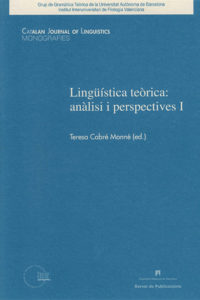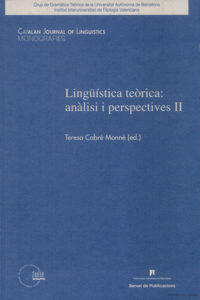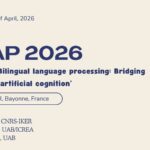14 maig, 2004
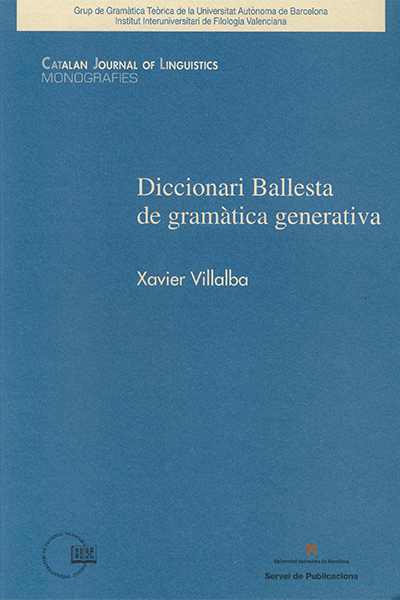
Autors:
Xavier Villalba
Títol:
Diccionari Ballesta de gramàtica generativaEditorial: Universitat Autònoma de Barcelona, Servei de Publicacions
Col·lecció: Monografies Catalan Journal of Linguistics #1Data de publicació: 2004
Pàgines: 207ISBN13: 8449023513
El Diccionari Ballesta de gramàtic generativa es una versió profundament actualitzada i ampliada del clàssic Diccionari de gramàtica generativo-transformacional de Joan-Manual Ballesta, que pretén donar cabuda a l'ampli cabal terminològic encunyat pels últims models de la gramàtica generativa durant la dècada del noranta, com ara el programa minimista, la teoria de l'optimitat o la morfologia distribuïda. A més de contribuir a la normalització teminològica del camp, aquesta obra constitueix una eina de consulta utilíssima per a lingüistes, estuidants de lingüística, traductors especialitzats i per a qualsevol persona interessada en l'evolució del corrent lingüístic més important de la segona meitat del segle XX: la gramàtica generativa.
Títols de la col·lecció / Also in this series:
8 setembre, 2021
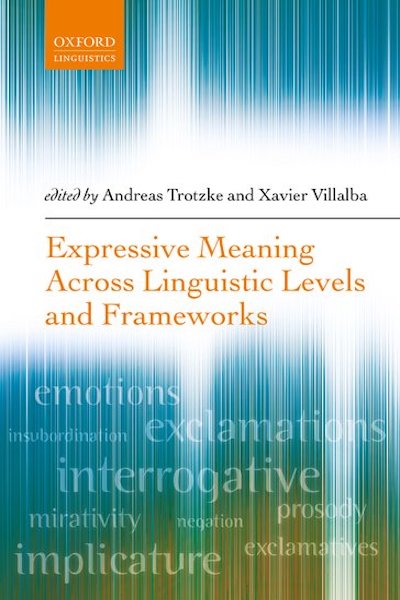
Autors:
Andreas Trotzke & Xavier Villalba
Títol:
Expressive Meaning Across Linguistic Levels and FrameworksEditorial: Oxford University Press
Data de publicació: Agost del 2021
Pàgines: 336ISBN13: 9780198871217
Més informacióThis volume is the first to explore the formal linguistic expressions of emotions at different levels of linguistic complexity. Research on the language-emotion interface has to date concentrated primarily on the conceptual dimension of emotions as expressed via language, with semantic and pragmatic studies dominating the field. The chapters in this book, in contrast, bring together work from different linguistic frameworks: generative syntax, functional and usage-based linguistics, formal semantics and pragmatics, and experimental phonology. The volume contributes to the growing field of research that explores the interaction between linguistic expressions and the 'expressive dimension' of language, and will be of interest to linguists from a range of theoretical backgrounds who are interested in the language-emotion interface.
18 desembre, 2020

Autors:
Xavier Villalba & Sílvia Planas-Morales
Títol:
Revista Española de Lingüística 50(2), 83-106Editorial: Sociedad Española de Lingüística
Més informació
Text completEn este artículo proponemos analizar los elementos que encabezan las relativas preposicionales de infinitivo (libros por/para leer) como complementantes preposicionales que se generan en el núcleo de SFinitud. Ello nos permite trazar claras diferencias con las construcciones preposicionales finales y causales y ofrecer al mismo tiempo un análisis uniforme para todas las relativas, sean finitas o no. También sugerimos que la lectura modal asociada a las relativas preposicionales se expresa mediante una categoría funcional específica ligada a la modalidad radical, lo que nos permite explicar parte de las restricciones combinatorias de estas relativas. Por último, proponemos extender este análisis a las relativas de infinitivo introducidas por que (libros que leer).
1 setembre, 2020
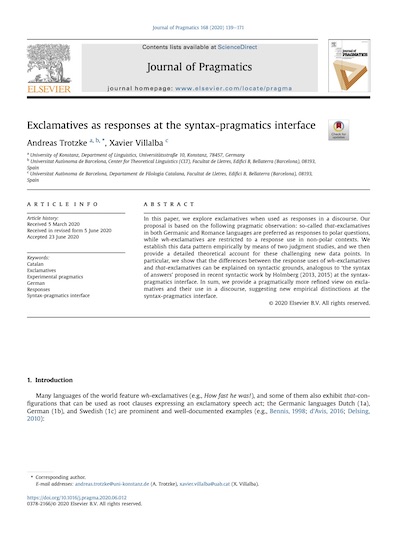
Autors:
Andreas Trotzke & Xavier Villalba
Títol:
Exclamatives as responses at the syntax-pragmatics interfaceEditorial: Journal of Pragmatics, 168 (pp. 139–171)
Data de publicació: Octubre del 2020
Més informació
Text completIn this paper, we explore exclamatives when used as responses in a discourse. Our proposal is based on the following pragmatic observation: so-called that-exclamatives in both Germanic and Romance languages are preferred as responses to polar questions, while wh-exclamatives are restricted to a response use in non-polar contexts. We establish this data pattern empirically by means of two judgment studies, and we then provide a detailed theoretical account for these challenging new data points. In particular, we show that the differences between the response uses of wh-exclamatives and that-exclamatives can be explained on syntactic grounds, analogous to ‘the syntax of answers’ proposed in recent syntactic work by Holmberg (2013, 2015) at the syntax-pragmatics interface. In sum, we provide a pragmatically more refined view on exclamatives and their use in a discourse, suggesting new empirical distinctions at the syntax-pragmatics interface.
17 febrer, 2020
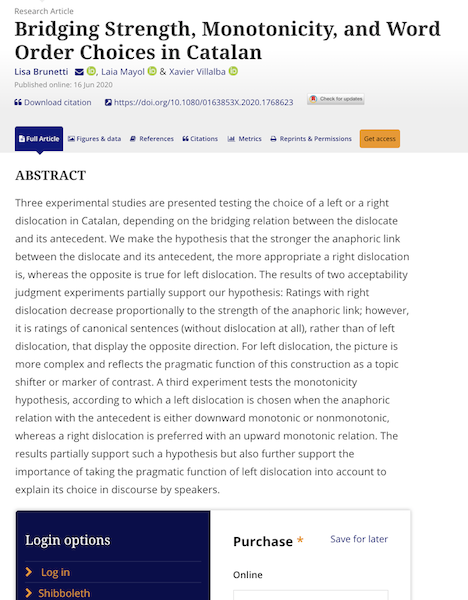
Autors:
Lisa Brunetti, Laia Mayol & Xavier Villalba
Títol:
Bridging Strength, Monotonicity, and Word Order Choices in CatalanEditorial: Discourse Processes
Data de publicació: Juny de 2020
Més informacióThree experimental studies are presented testing the choice of a left or a right dislocation in Catalan, depending on the bridging relation between the dislocate and its antecedent. We make the hypothesis that the stronger the anaphoric link between the dislocate and its antecedent, the more appropriate a right dislocation is, whereas the opposite is true for left dislocation. The results of two acceptability judgment experiments partially support our hypothesis: Ratings with right dislocation decrease proportionally to the strength of the anaphoric link; however, it is ratings of canonical sentences (without dislocation at all), rather than of left dislocation, that display the opposite direction. For left dislocation, the picture is more complex and reflects the pragmatic function of this construction as a topic shifter or marker of contrast. A third experiment tests the monotonicity hypothesis, according to which a left dislocation is chosen when the anaphoric relation with the antecedent is either downward monotonic or nonmonotonic, whereas a right dislocation is preferred with an upward monotonic relation. The results partially support such a hypothesis but also further support the importance of taking the pragmatic function of left dislocation into account to explain its choice in discourse by speakers.


